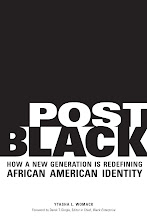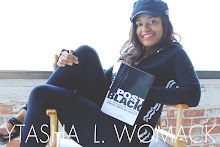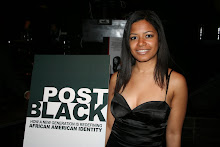Tuesday, February 2, 2010
"You'll Be A Man" doc: Interview with Producer Shawn Wallace
Shawn Wallace is a musician and producer of the upcoming documentary You'll Be A Man. The documentary explores masculinity and identity. The title is taken from the last line of Rudyard Kipling's poem “If.”
YLW: How did you develop the concept for You Will Be A Man?
SW: It's really the brainchild of Robert Goodwin (producer.) He said his deceased grandfather came to him in a dream and told him to tell it like it is. Originally, we wanted to talk about how men feel about themselves on the 20th anniversary of our pledge line. We're both in Alpha Phi Alpha.
Then a friend suggested we do it on black men in general. We interviewed men from all walks of life, teenagers, grandfathers. We talked to Dr. Lee Butler, from the Chicago Theological Seminary. A lot of the focus of his work helped us to find our view. We interviewed both men and women. We asked both what do men do and what is a man. Most immediately identified what a man does, but most had problems saying what a man is. It was very illuminating.
YLW: What did they say men do?
SW: Most say a man is a provider, nurtures his family, takes care of his family, his community. He works. That sort of thing. Usual traditional roles. He's a father, brother, husband, son.
YLW: Why couldn't they explain what a man is?
SW: Most people found it difficult to answer that question. The more we dug into it, the more I realized that it's a question of identity. I think it's the question of our generation. Identity. Who are we? Our issues are much more psycho spiritual and I don't know if we have the language to talk about it yet.
The questions that we are faced with in this day and age are slightly different from previous generations. Other generations dealt more with survival. So there was more of a focus on function. I don't know if by answering those questions in terms of duty that we've found the sense of fulfillment we expected. We're asking who are we. What does it mean to be a human being, a man, a black man?
YLW: I agree. I think many people are rethinking the terms they use to describe themselves because definitions are changing.
SW: One woman who was with her husband said a man is a soldier of God. We found that to be interesting. Both sets of people, men and women, they could zero in on what a man does, but what is he is a question that needs to be asked more often so we can begin to be that answer. It brings up issues of self determination.
YLW: Why is male identity a big issue today?
SW: The conditions in our community have changed. We have more female headed households. I think we ask the identity question because it may be the way we affect the changes we want to see in our lives. Just doing certain things has not brought us the fulfillment that we thought it would. Knowing your true purpose on earth is key. I remember so many in our generation were taught to go to college to get a good job.
SW: So there was less of an emphasis on going to college and studying something you love or are interested in. It was study this because you will make money. So you identified yourself based on what you do, your educational marker. But I saw my contemporaries question why are we doing what we're doing. A lot of my friends got degrees in one field and completely went back to school and said I don't want to do this. Others felt trapped. There's more to life than having nice things and buying nice stuff. We're challenged to have a good job, but a good job alone is not just fulfilling. The ideas that you can't love what you do and make money from it is something that people are starting to challenge and I think as a result starting to question our identity.
I've seen some interesting attitudes. I've seen an attitude in our community in which women feel they are stronger, smarter and better than men.
YLW: Really? What do you mean?
SW: There is this idea that the condition of being a woman fundamentally means that you are emotionally stronger and better than a man just because you are a woman. I had a conversation with a security guard, a woman, and she said well, we're stronger than men anyway. I've heard it from teenage girls that I've taught. I just try to observe it. I think it's born out of the conditions in which our community exists. Black women have had to lead our communities.
YLW: Do you think that's a burgeoning attitude among women in general?
SW: Yes. I don't think it's just a black paradigm, I've just observed it on our community.
It may be a reflection for a need for mens and womens long house. This is where the men go, this is where the woman go. Men initiate men into manhood, women initiate women. It doesn't mean that interdependence isn't present, but femininity and masculinity are defined in that subgroup as a whole.
YLW: What else did you discover?
SW: One of the things we talk about in the film are rights of passage and we compare fraternities and street gangs. Both are fulfilling a need of rights of passage for men to demarcate certain steps toward manhood. We found similarities in terms of what the group gave them, various intangibles like a sense of family and belonging. It was really illuminating. Not that that study hasn't been done before, but there's probably more of a need for it now. And that's not a black phenomenon, either.
YLW: Is the definition of manhood changing?
SW: It's definitely changing because we've had to deal with certain dark secrets including homosexuality, bisexuality, and our sexual identity as men. Masculinity is evident in men regardless of their sexual orientation. Men have testosterone in their body. A gay man is still a man. A gay man is a man first who just has a certain sexual orientation, so that doesn't take away from his masculinity. While some gay men may have an air of what they think femininity is, or acting the way they think a woman acts, even that isn't how a woman acts. I don't know a lot of women who act like gay men. I think some of the ways we act as men and women aren't just how we're groomed, but just hormone differences so we react to things differently.
I've had the same debate with women in certain situations, I don't care if a woman is gay straight, whatever, she's a woman. She's going to react in the way that a woman reacts.
YLW: How has the definition of manhood changed?
SW: Rob and I were talking earlier and we were saying that the role men played early on, their primary role was to bring home money. It's changed drastically and for the better. We're moving more toward a balance for both men and women. The feminine and masculine sides of ourselves are moving towards the center and we're being an individual. Everyone can express their masculine and feminine sides in a balanced way. Men are being asked to parent and nurture in ways they weren't asked of them 30 or 40 years ago. Some things that we associate with masculinity and femininity are expressed in both sexes. We're moving towards a balance of masculine and femininity within individuals in terms of roles.
YLW: In Post Black, I talk about how I don't know the difference between a male and female activity. When you're taught at a young age that you can do anything, those traditional roles don't hold any weight.
SW: I have that, too. What do women do that I can't do? I can't come up with anything other than they're not me.
YLW: What are your hopes with the documentary?
SW: We hope that it will be a primer for young men to help shape their identity. It's more about identity than a where are black men and this is what they're dealing with piece. Hopefully, it's interesting enough to the audience so that they like it.
We've been working on it for three years. We're done with photography and now we're in the editing process.
Subscribe to:
Post Comments (Atom)




No comments:
Post a Comment